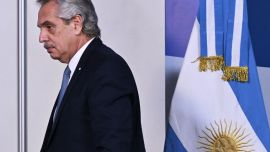Rainbow-coloured flags, parasols, and posters flooded Avenida de Mayo and spilled out onto the sidewalks of downtown Buenos Aires on Saturday as tens of thousands of demonstrators marched from Congress to the Plaza de Mayo.
A drag queen paraded around on a white van plastered in protest signs. Lesbians danced to the beat of their own chant. Two men shared a kiss in the middle of the street.
The protesters gathered for a peaceful procession to denounce statements made by President Javier Milei during his speech at Davos last month. Argentina's outspoken leader delivered inflammatory remarks about the LGBTQ community on a global stage, implying a link between queer people, paedophilia and sexual abuse.
María Rachid, a former member of the Buenos Aires legislature and co-founder of the Federación Argentina de Lesbianas, Gays, Bisexuales y Trans (FALGBT), described Milei’s comments as “profoundly ignorant” and “absolutely discriminatory.”
Mánoli Walde, a transgender woman, said the march not only denounced Milei’s disparaging remarks about the queer community, but also the concrete anti-LGBTQ economic policies the federal government has passed.
“Everything came to a head in Milei’s speech in Davos, but we are really here because of the economic issues,” Walde told the Times. “They are defunding hormone therapy for people like me, like all of my transvestite friends. They are defunding PREP for people with HIV and other sexually-transmitted diseases.”
The 24-year-old twirled and danced with her friends as they walked to the beat of a drum nearby, while others cheered from the window balconies above. She wore a flyer with a photo of Sofía Fernández, a victim of travesticide. A criminal case against police officers for her alleged murder and torture behind bars is currently under investigation.
“It is important to always carry our companions with us,” Walde noted.
Milei recently threatened to repeal femicide’s distinction as a criminal aggravation under the law and eliminate legal labour quotas for transgender people in state positions.
Cabinet Chief Guillermo Francos on Monday dismissed the weekend’s protest as insignificant and regarding “completely politicised” issues.
“In no way does the president or anyone in his team have phobic beliefs against a collective we know exists,” Francos said. “I’m very sorry for the misinterpretation.”
For those in attendance, though, Saturday proved to be a deeply moving experience.
“I almost cried on the way here because this is so exciting,” expressed Toxinas Córdoba, a 13-year-old transgender boy. “This is the first protest I have been to.”
Toxinas attended the march alongside his parents and sister, Estela, all of whom drove in from Escobar, a city just north of Buenos Aires, to support him.
“One of my sons is going through a transition in his adolescence, and I want to be there for him. He is a part of me,” said father Andrés Córdoba.
Toxinas and Estela walked just ahead of their father, holding up homemade signs.
“It is a march for human rights because queer people are also human. The current president accuses us of having lice and being stinky paedophiles when that isn’t true,” he said.
While the march heavily featured pro-LGBTQ protestors, it was also attended by individuals, organisations and political parties championing gender equality, labour rights and access to healthcare.
“We can proudly say that the queer community is responsible for merging all of these struggles together,” Walde said.
To Santa Fe lawmaker Esteban Paulón, the protest directly defended the democratic values forged at the fall of Argentina’s last military dictatorship 40 years ago.
“This is without doubt a multitudinous march in defence of democracy and the democratic values that have developed in the 41 years since the return of democracy and the end of dictatorship in Argentina,” said the lawmaker.
Luciana Elger Vargas, a primary school teacher and art teacher, attended the march as part of an intergenerational group of protestors composed of her 96-year-old grandmother, her middle-aged friends, and her friend’s 18-month-old daughter.
For her, Saturday’s protest was a chance to both stand up against government oppression and teach a younger generation the importance of doing so.
Vargas recalled going to Plaza del Mayo as a young girl to feed the birds, while her grandmother participated in the weekly marches with the Abuelas de Plaza de Mayo, as they rallied seeking information about their disappeared loved ones.
“This forging of values, of knowing why we mobilise and of defending one’s rights, is done during childhood,” Vargas said, as her young companion painted with watercolours beside her.
Vargas, who teaches to children living in the slums of the city, stressed the importance of educating younger generations about social issues, linking the struggles of the past with those of the present.
“I choose to keep working there because I believe it is the responsibility of those of us with more awareness to create awareness in others. These governments want the lower class to keep getting poorer and dumber,” the primary school teacher said. “I think it is important to counter that.”
She hopes Saturday’s march sent a clear message to Milei’s administration: “I think the government has to realise that they cannot keep playing games with us. They are defeated.”
“The president chose the wrong enemy,” Paulón echoed.
by Melissa Canales & Zella Milfred



















Comments